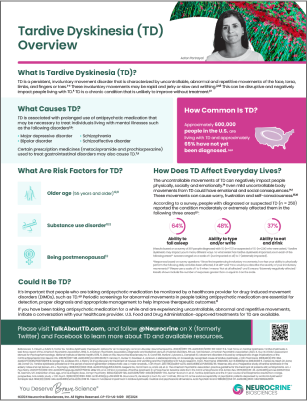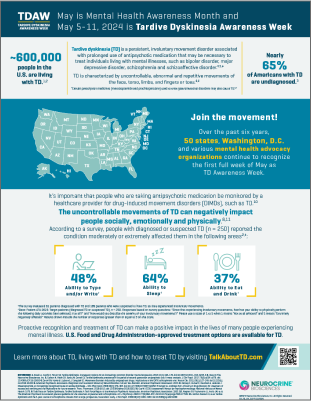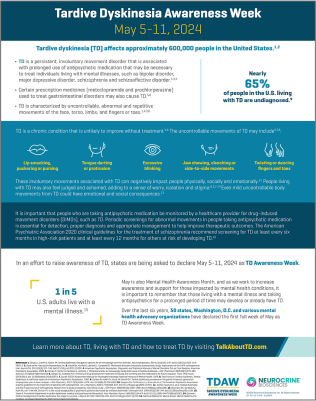

TD Awareness
Tardive dyskinesia (TD) is an involuntary movement disorder that is characterized by uncontrollable movements of the face, torso, limbs and fingers or toes.
TD is associated with use of antipsychotic medication that may be necessary to treat individuals living with mental illnesses such as bipolar disorder, major depressive disorder, schizophrenia and schizoaffective disorder.
The abnormal, involuntary and repetitive movements associated with TD may be rapid and jerky or slow and writhing. TD is a chronic condition unlikely to improve without treatment.
Neurocrine Biosciences Supports TD Awareness Week
Neurocrine Biosciences is committed to bringing awareness to TD every day, but especially during Tardive Dyskinesia Awareness Week, recognized during the first full week of May. TD Awareness Week aims to help decrease stigma, improve recognition and increase routine screenings, diagnosis and awareness of appropriate treatment of TD.
Mental health continues to be a significant challenge in the United States, and it is important to include TD in the conversation because of the physical, social and emotional consequences this disorder can have on people trying to maintain mental health stability with antipsychotic medication.
We aren’t the only ones who support this mission. Since its inception in 2018, all 50 states, Washington, D.C. and multiple mental health advocacy organizations continue to recognize TD Awareness Week. To follow and join the conversation on social media, search for #TDAwarenessWeek and #Screen4TD.

The Impact of TD
TD is estimated to affect at least 800,000 adults in the United States. Of those living with TD, approximately 60% remain undiagnosed.
According to a survey, patients with a confirmed TD diagnosis (n=75) reported that the condition extremely negatively affected them in areas such as the following*†:
57%
Social life‡
51%
Mental health‡
45%
Ability to perform their job‡
People living with TD may also feel judged and ashamed, adding to a sense of worry, isolation and stigma. Even mild uncontrollable body movements from TD could have emotional and social consequences.‡ These movements can cause worry, frustration and self-consciousness.
The Importance of Routine Screening for TD
Proactive recognition and treatment of TD can make a positive impact for many people who are already managing their mental illness, including their loved ones or care partners.
Neurocrine is committed to working with all segments of the healthcare system—patients, care partners, advocacy organizations, healthcare providers, government and public health officials—to advocate for routine screenings for TD as the standard of care for at-risk patients.
-
FAQs
|-
TD is an involuntary movement disorder that is characterized by uncontrollable movements of the face, torso, limbs and fingers or toes. TD is associated with use of antipsychotic medication that may be necessary to treat individuals living with mental illnesses such as bipolar disorder, major depressive disorder, schizophrenia and schizoaffective disorder.
-
People living with a mental health condition, such as bipolar disorder, major depressive disorder, schizophrenia and schizoaffective disorder, who take necessary antipsychotic medication for a prolonged period of time may develop TD. Certain prescription medicines (metoclopramide and prochlorperazine) used to treat gastrointestinal disorders may also cause TD. Other factors may also play a role in an individual’s risk for TD:
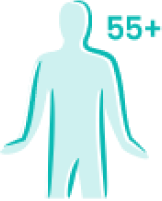
Being older (55 years and above)

Having a substance use disorder

Being postmenopausal
-
Despite the number of people impacted by the condition, many people remain unfamiliar with TD. However, for people living with TD, their families and their care partners, it is important to know that they are not alone. Approximately 60% of those living with TD in the U.S. remain undiagnosed. Increasing awareness will help more people to get diagnosed and receive the help they need.
-
TD Awareness Week is the first full week of May. May is also Mental Health Awareness Month, which brings attention to the one in five U.S. adults who lives with a mental illness. As we work to increase awareness and support for those impacted by mental health conditions, it is important to remember that those living with a mental health condition and who have taken antipsychotic medication may develop or may already have TD.
-
Since its inception in 2018, all 50 states, Washington, D.C. and multiple mental health advocacy organizations have recognized TD Awareness Week.
-
To learn more about TD, living with TD and how to treat TD, visit TalkAboutTD.com. Healthcare professionals can visit MIND-TD.com for helpful information on identification of TD and differentiation from other movement disorders.
-
Resources
Download these resources for more information about TD and TD Awareness Week.
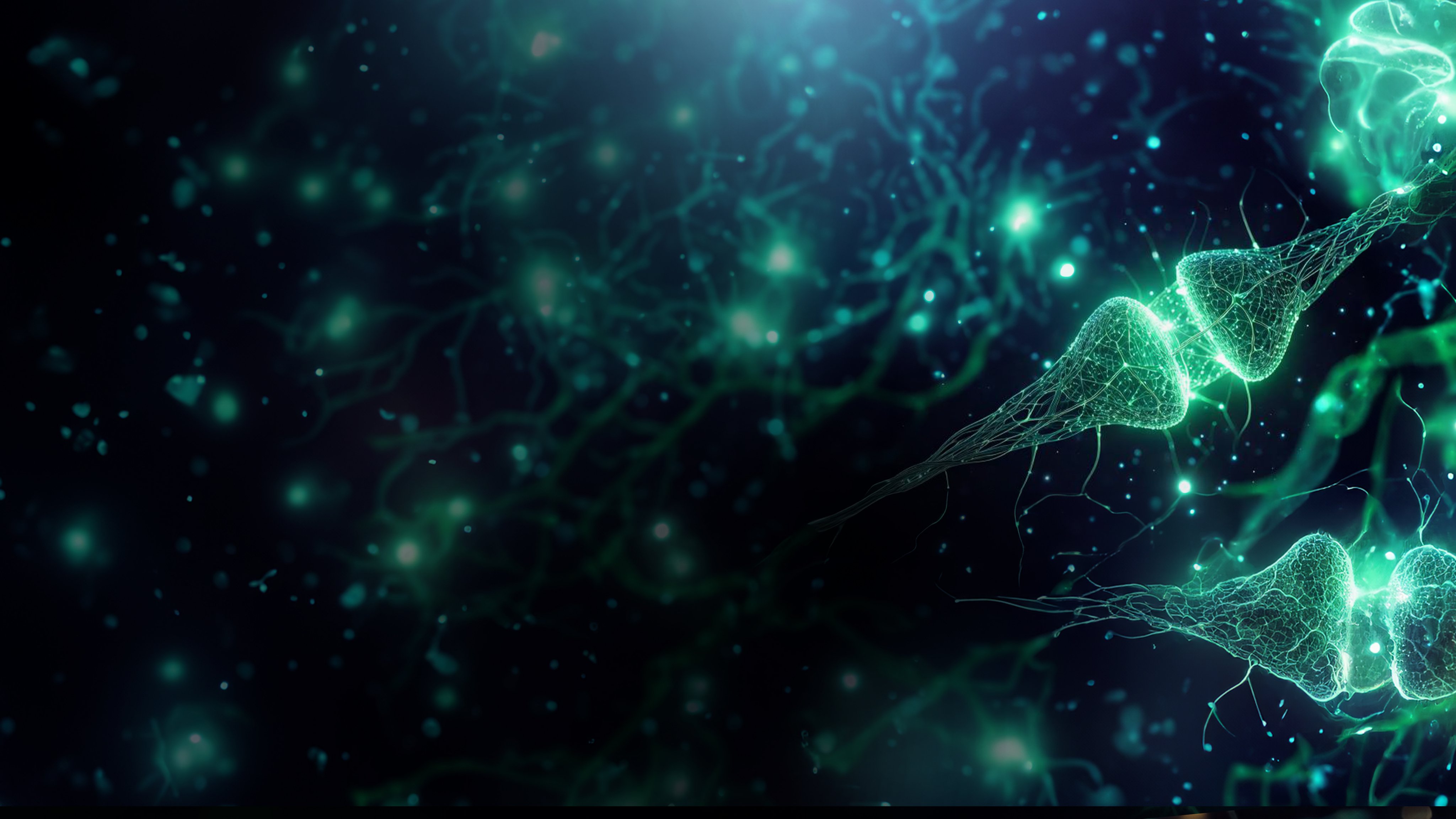
Approved Medicines
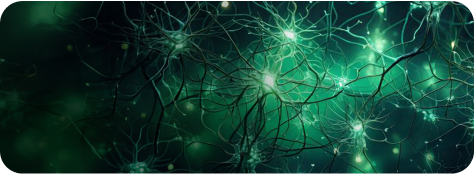
Clinical Studies
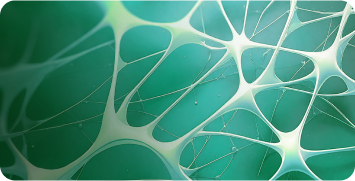
Therapeutic Areas
*Tardive Dyskinesia Patient ATU 2024 Wave 2. Target patients (diagnosed TD or suspected TD), n=175.
†Results based on a survey of 175 people with a confirmed TD diagnosis (n=75) or with suspected TD (n=100) who were asked to rate the effects of the condition on various aspects of life. Results shown include the number of responses among people with a confirmed TD diagnosis (n=75) who rated a 6 or 7 on the scale to indicate that the aspect of life is “extremely negatively affected” by TD.
‡Responses based on survey question: “Since first experiencing [CONDITION], how have the following areas of your life been affected, if at all?” Please select your rating using a scale of 1 to 7 when 1 means “not at all affected” and 7 means “extremely negatively affected.” Results shown include the number of responses greater than or equal to 6 on the scale.
